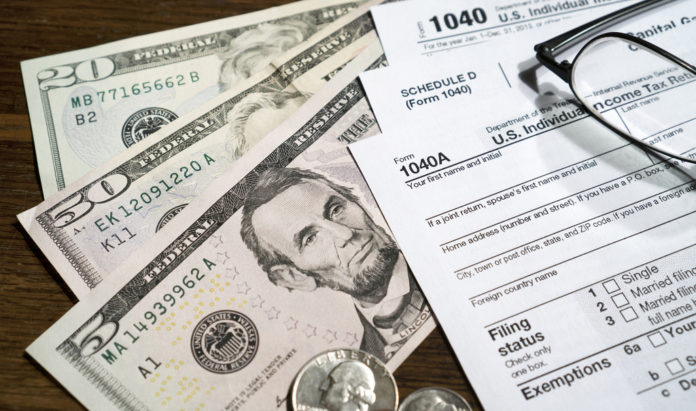A Senate committee on Tuesday approved a new tax bill that would be less costly because it removes a major provision that would allow businesses to seek refunds for taxes they paid in previous years.
The Senate tax committee sent this session’s biggest piece of tax legislation to the full chamber after signing off on changes intended to reduce the cost of the bill in hopes that it might win suppport from Democratic Gov. Laura Kelly.
The bill emerged from committee with an estimated cost of $175 million in the first year, compared to $326 million in the original bill.
Over three years, the bill would cost an estimated $422 million compared to about $614 million in the original bill.
Kelly has previously vetoed similar legislation saying it was too costly and would wreck the state’s budget.
She has already signaled that she would reject new tax bills that would leave a hole in the state budget.
The tax bill originated as a result of federal tax reform in 2017 and has been hotly debated each of the last two legislative sessions.
Kansas is considered a “rolling conformity” state, meaning it must conform with any changes to the federal tax code automatically unless otherwise authorized by the Legislature.
As a result, the state has started collecting taxes from some sources it hadn’t previously received revenue from in the past.
“This is an attempt to address the tax increase without an exorbitant fiscal note,” said Republican Sen. Caryn Tyson, chair of the Senate Tax Committee.
At least one conservative Republican senator – Mark Steffen of Hutchinson – registered an objection to the changes.
“This was an unintended tax increase originally. We’re just back tracking too fast for my taste. You can’t even call this a tax cut and we’re backing down,” Steffen said.
Tyson acknowledged that she was reluctantly rewriting the bill, but said changes need to be made in the spirit of compromise.
“We have to be realistic,” Tyson said. “If we get zero, that’s the increase. I understand your concern. I’m with you 100%. I just know that the reality of the situation is this bill is better than nothing. Right now, I will take this bill in its form.”
Kansas Action for Children, which has opposed the legislation, wasn’t satisfied with the changes.
“The Senate tax committee should not have sent (the bill) to the floor,” said Emily Fetsch, KAC’s director of fiscal policy.
“The needs of corporations and high-income earners shouldn’t come before those of everyday Kansans who have faced unemployment and health challenges during the pandemic,” Fetsch said in an email.
“We should all be focused on making the state work for them.”
The committee removed a section that would allow taxpayers to carry back their net operating losses as provided by tax code changes made by the so-called CARES Act to foster an easier economic recovery.
Kansas taxpayers are now allowed to carry forward net operating losses — when a business’ tax deductions exceed its taxable income — for up to 10 years.
They are currently not allowed to carry net operating losses back to previous years so they can be applied to previous returns for an immediate refund of prior taxes paid.
Under original the bill, a net operating loss from tax years beginning in 2018, 2019 or 2020 could have been carried back five years and carried forward indefinitely.
The carryback element of the bill would have cost the state budget about $100 million in the first year and $20 million in each of the following two years.
The new bill leaves the carryforward component in the bill.
The bill would still exempt so-called global intangible low-taxed income starting in 2021.
However, businesses would not be able to capture money from the so-called GILTI tax going back in time.
Under the original bill, in the two years before 2020, global intangible low-taxed income would have been treated as a foreign dividend and only 20% of the income would have been taxed.
The committee removed that provision, saving the state about $57 million in 2022.
The bill also moves the start date of other provisions from 2020 to 2021, including deductions for business meal expenses, allowing banks to deduct their FDIC insurance premiums and businesses to deduct the full amount of business interest.
The legislation would still allow individuals to itemize on their state tax returns – starting in tax year 2020 – if they don’t itemize on their federal form.
Kansans are not likely to itemize on their state return after federal tax reform in 2017 boosted the federal standard deduction to $12,400 for a single person and $24,800 for a married couple.
The state deduction is $3,000 for a single person and $7,500 for joint filers.
The itemization component is estimated to cost about $121 million in fiscal 2022, $61.5 million in 2023 and $62.1 million in 2024.
The cost of itemizing is frontloaded in 2022 because it would be retroactive to 2020.















